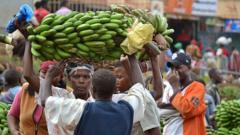**The ongoing trade dispute between Malawi and Tanzania intensifies, affecting traders, particularly women, as agricultural goods face bans and restrictions, leading to significant financial losses.**
**Escalating Tensions: Malawi-Tanzania Trade Ban impacts Small Traders**

**Escalating Tensions: Malawi-Tanzania Trade Ban impacts Small Traders**
**Small traders hit hard as Malawi and Tanzania's agricultural import bans deepen business losses at border.**
In an alarming turn of events, small traders in Malawi are feeling the repercussions of a trade ban imposed by Tanzania on all agricultural imports, escalating a regional trade dispute that has left many in financial turmoil. Businesswomen from the border regions reported devastating losses as Tanzanian authorities enforced the restrictions with little notice. "My bananas were seized and destroyed, leaving my business struggling for survival," recounted Jestina Chanya, a trader in Karonga.
Tanzania's enforcement ramped up as they responded to Malawi's earlier restrictions, which aimed to protect local farmers, particularly against imports of staple goods such as bananas, rice, and maize. Tanzania's Agriculture Minister, Hussein Bashe, stated that ongoing negotiations would seek to resolve the disputes while asserting, "Our businesses must be protected from unfair competition."
The border crossing at Kasumulu, typically a bustling trade hub, is now eerily quiet as traders face heightened scrutiny. Women traders reported instances of harassment and enforcement actions that sought to impede the flow of Tanzanian goods into Malawi. "We are marginalized, while larger traders evade scrutiny," lamented June Mwamwaja, another affected trader.
The ramifications of this trade stalemate are widespread; Malawian and Tanzanian farmers alike are now witnessing their perishable goods rot at the border. Amidst the chaos, a video shared by Bashe showed a truckload of rejected bananas, underscoring the frustration on both sides.
Malawian traders expressed a clear preference for Tanzanian agricultural products, notably due to their size and quality, with many indicating they could not compete with locally sourced items. "Tanzanian produce is generally preferable to ours in terms of quality and cost," noted Jeniffa Mshani, highlighting the struggle that smaller traders experience amidst the economic pressures.
This escalating trade conflict raises concerns over the potential impacts on larger regional trade agreements, particularly as the African continent seeks to enhance free trade efforts initiated in recent years. Malawi's spokesperson on trade acknowledged the severe impacts on local markets but claimed a lack of official communication from the Tanzanian side.
The conflict’s resolution appears uncertain as both nations grapple with their economic interests and the implications for thousands of small traders whose livelihoods hang in the balance. As tensions rise, the hope for a diplomatic resolution hangs precariously in the air, amplifying the plight of women traders on the frontline.
Tanzania's enforcement ramped up as they responded to Malawi's earlier restrictions, which aimed to protect local farmers, particularly against imports of staple goods such as bananas, rice, and maize. Tanzania's Agriculture Minister, Hussein Bashe, stated that ongoing negotiations would seek to resolve the disputes while asserting, "Our businesses must be protected from unfair competition."
The border crossing at Kasumulu, typically a bustling trade hub, is now eerily quiet as traders face heightened scrutiny. Women traders reported instances of harassment and enforcement actions that sought to impede the flow of Tanzanian goods into Malawi. "We are marginalized, while larger traders evade scrutiny," lamented June Mwamwaja, another affected trader.
The ramifications of this trade stalemate are widespread; Malawian and Tanzanian farmers alike are now witnessing their perishable goods rot at the border. Amidst the chaos, a video shared by Bashe showed a truckload of rejected bananas, underscoring the frustration on both sides.
Malawian traders expressed a clear preference for Tanzanian agricultural products, notably due to their size and quality, with many indicating they could not compete with locally sourced items. "Tanzanian produce is generally preferable to ours in terms of quality and cost," noted Jeniffa Mshani, highlighting the struggle that smaller traders experience amidst the economic pressures.
This escalating trade conflict raises concerns over the potential impacts on larger regional trade agreements, particularly as the African continent seeks to enhance free trade efforts initiated in recent years. Malawi's spokesperson on trade acknowledged the severe impacts on local markets but claimed a lack of official communication from the Tanzanian side.
The conflict’s resolution appears uncertain as both nations grapple with their economic interests and the implications for thousands of small traders whose livelihoods hang in the balance. As tensions rise, the hope for a diplomatic resolution hangs precariously in the air, amplifying the plight of women traders on the frontline.




















